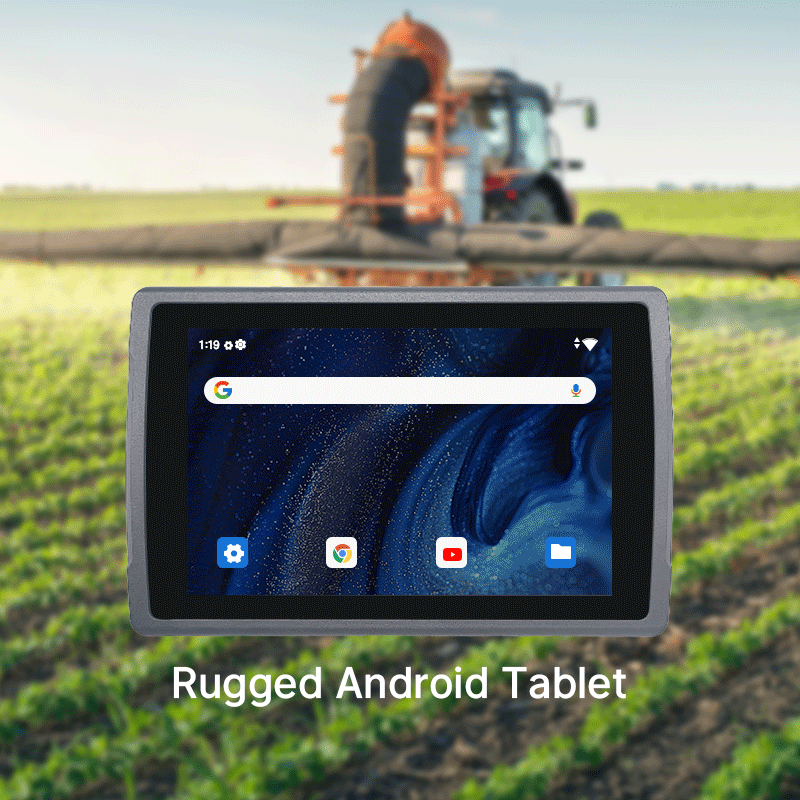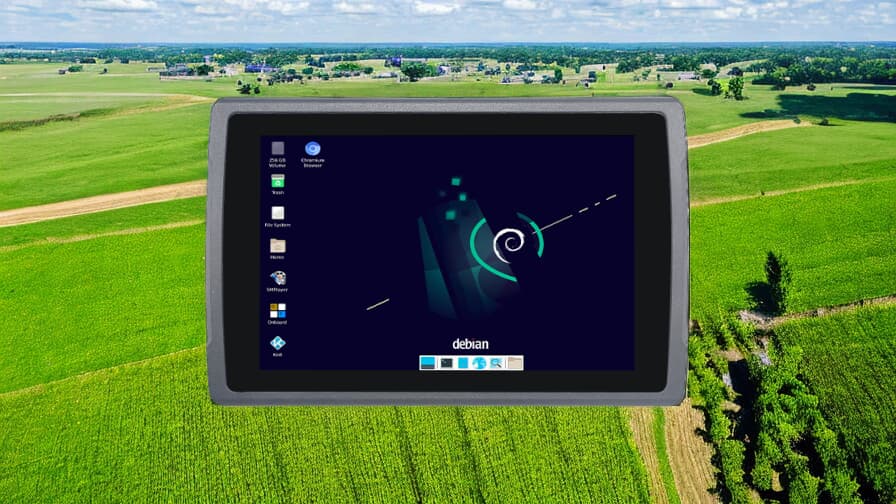Agriculture has always been a cornerstone of human civilization, and with the advent of modern technology, this sector is undergoing a profound transformation. Rugged Linux tablets equipped with Real-Time Kinematic (RTK) technology are emerging as indispensable tools, enabling precision farming and enhancing efficiency in agricultural operations.
What is RTK Technology, and Why Does It Matter in Agriculture?
Real-Time Kinematic (RTK) is a satellite navigation technology that offers centimeter-level accuracy by correcting the positioning data obtained from GPS, GLONASS, and other satellite systems. RTK achieves this high level of precision by utilizing a base station to send real-time corrections to a rover, such as a rugged Linux tablet or other compatible devices.
For the agricultural industry, this means:
- Enhanced Precision: RTK allows farmers to map fields with incredible accuracy, enabling them to plant seeds, apply fertilizers, and harvest crops with minimal error.
- Reduced Waste: Precise application of inputs like water, pesticides, and fertilizers minimizes waste, reducing costs and environmental impact.
- Time Efficiency: Farmers can complete their tasks faster, ensuring optimal planting and harvesting schedules.
The Role of Rugged Linux Tablets in Agriculture
Rugged Linux tablets are robust computing devices specifically designed to operate in harsh environments. They offer several advantages that make them ideal for agricultural applications:
1. Durability and Weather Resistance
Agricultural work often exposes devices to extreme conditions, including dust, water, and temperature fluctuations. Rugged Linux tablets are built to withstand these challenges, ensuring uninterrupted operation regardless of the environment.
2. Seamless Integration with RTK Systems
Most rugged Linux tablets are equipped with high-precision GPS modules that are compatible with RTK technology. This integration ensures real-time data accuracy, which is crucial for tasks such as soil sampling, crop monitoring, and autonomous machinery control.
3. Open-Source Versatility
Running on Linux, these tablets offer unmatched flexibility and customization. Open-source software allows farmers to tailor applications for specific needs, from creating detailed field maps to automating irrigation systems.
4. Connectivity and Data Sharing
Modern rugged Linux tablets support multiple connectivity options, including Wi-Fi, Bluetooth, 4G/5G, and LoRaWAN. These capabilities enable seamless data sharing between devices, machines, and cloud platforms, facilitating better decision-making.
5. Long Battery Life and Portability
Designed for fieldwork, these tablets feature long-lasting batteries and lightweight designs, allowing farmers to carry them comfortably across vast farmlands without frequent recharges.
How Rugged Linux Tablets Enhance RTK Applications in Agriculture
Precision Planting and Seeding
With RTK-enabled rugged Linux tablets, farmers can achieve precise row spacing and seeding depth, maximizing yield potential. The high accuracy ensures that every seed is planted in the optimal location, reducing overlaps and missed areas.
Automated Machinery Guidance
RTK guidance systems, paired with rugged Linux tablets, allow tractors, harvesters, and other machinery to operate autonomously. This technology ensures straight rows and consistent patterns, even in low-visibility conditions such as nighttime or foggy weather.
Irrigation Management
Using data collected via RTK-equipped sensors and rugged tablets, farmers can create detailed water distribution maps. This information helps in optimizing irrigation schedules, ensuring water is distributed efficiently across fields.
Soil and Crop Analysis
Rugged Linux tablets enable real-time soil and crop monitoring through integrated sensors. These devices can analyze soil moisture, pH levels, and nutrient content, providing actionable insights to farmers for better crop management.
Drone Integration for Aerial Surveys
Rugged Linux tablets can serve as control centers for agricultural drones equipped with RTK capabilities. These drones provide high-resolution aerial imagery, enabling farmers to monitor large areas, detect pest infestations, and assess crop health.
Key Features to Look for in Rugged Linux Tablets for Agriculture
When selecting a rugged Linux tablet for agricultural applications, consider the following features:
- RTK Compatibility: Ensure the device supports RTK corrections for precise positioning.
- IP Ratings: Look for a high Ingress Protection (IP) rating, such as IP67 or IP68, to ensure water and dust resistance.
- Processing Power: A fast processor, like a Quad-Core ARM or equivalent, is essential for handling complex agricultural software.
- Daylight-Readable Display: A bright, anti-glare screen ensures visibility under direct sunlight.
- Expandable Storage: Ample storage capacity, with options for expansion, is crucial for storing maps, images, and sensor data.
- Connectivity Options: The device should support various communication protocols to ensure seamless data sharing and integration with other systems.
Real-World Applications: Success Stories
Farmers worldwide are reaping the benefits of combining rugged Linux tablets with RTK technology. For instance:
- Precision Viticulture in France: Vineyards in Bordeaux use RTK-enabled rugged tablets to map and manage grapevine rows, optimizing harvest quality and yield.
- Smart Farming in Australia: Large-scale farms rely on these devices for autonomous tractor operations, significantly reducing labor costs.
- Rice Cultivation in Asia: RTK systems paired with rugged tablets enable precise water management in paddy fields, conserving water and improving crop outcomes.
The Future of Agriculture with Rugged Linux Tablets and RTK
As technology continues to advance, the synergy between rugged Linux tablets and RTK systems will drive further innovation in agriculture. Emerging trends include:
- AI and Machine Learning Integration: Advanced algorithms will analyze RTK data to predict crop yields and optimize resource allocation.
- IoT Connectivity: Rugged tablets will act as central hubs, connecting various IoT devices across the farm for real-time monitoring and automation.
- Sustainability Initiatives: Precision agriculture powered by RTK and rugged tablets will contribute to more sustainable farming practices by reducing waste and conserving resources.


评论
发表评论